 Petzlover
Petzlover Grand Anglo-Francais Blanc et Noir is originated from France but Greater Swiss Mountain Dog is originated from Switzerland. Both Grand Anglo-Francais Blanc et Noir and Greater Swiss Mountain Dog are of same height. Grand Anglo-Francais Blanc et Noir may weigh 38 kg / 83 pounds lesser than Greater Swiss Mountain Dog. Both Grand Anglo-Francais Blanc et Noir and Greater Swiss Mountain Dog has same life span. Both Grand Anglo-Francais Blanc et Noir and Greater Swiss Mountain Dog has same litter size. Both Grand Anglo-Francais Blanc et Noir and Greater Swiss Mountain Dog requires Moderate Maintenance.
Grand Anglo-Francais Blanc et Noir is originated from France but Greater Swiss Mountain Dog is originated from Switzerland. Both Grand Anglo-Francais Blanc et Noir and Greater Swiss Mountain Dog are of same height. Grand Anglo-Francais Blanc et Noir may weigh 38 kg / 83 pounds lesser than Greater Swiss Mountain Dog. Both Grand Anglo-Francais Blanc et Noir and Greater Swiss Mountain Dog has same life span. Both Grand Anglo-Francais Blanc et Noir and Greater Swiss Mountain Dog has same litter size. Both Grand Anglo-Francais Blanc et Noir and Greater Swiss Mountain Dog requires Moderate Maintenance.
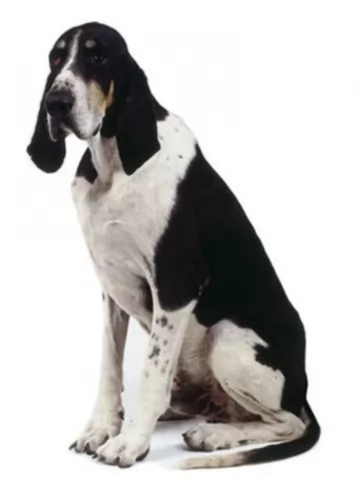 Known also as the Great Anglo-Francais, White and Black Hound or the Grand Anglo, the Francais Blanc et Noir is one of several breeds of hounds.
Known also as the Great Anglo-Francais, White and Black Hound or the Grand Anglo, the Francais Blanc et Noir is one of several breeds of hounds.
The dog was bred by crossing French scenthounds with English Foxhounds.The Grand Anglo-Français Blanc et Noir has always been used for hunting. As a scenthound, hunting was always done in packs and he thrilled at the chase.
The large dog originates in France and is recognized by the French Kennel Club as well as the Federation Cynologique Internationale.The purpose of this breed standard is to provide guidelines for breeders wishing to maintain the quality of their breed, but to also improve it.
 Hailing from Switzerland, and one of its oldest dog breeds, the Greater Swiss Mountain Dog has a dubious history in that there are a number of theories as to its origin. He is closely related to the Bernese Mountain Dog, Saint Bernard and Rottweiler.
Hailing from Switzerland, and one of its oldest dog breeds, the Greater Swiss Mountain Dog has a dubious history in that there are a number of theories as to its origin. He is closely related to the Bernese Mountain Dog, Saint Bernard and Rottweiler.
Of all the theories, the one that says he is descended from large, mastiff-like dogs is a popular one. He used to be a herding- and guard dog, but also was used to pull carts of farm produce.
It was in the 1900s that the dog’s numbers started dwindling. In 1908, canine researcher, Albert Heim recognized the dogs as being large members of the Sennenhund type, a family of four breeds that includes the Greater Swiss Mountain Dog.
He wanted to see the dogs recognized as a separate breed and the Swiss Kennel Club listed the Greater Swiss Mountain Dog in 1909.
In 1968 they were brought to the United States and a club for them was formed. The dog was recognized by the American Kennel Club in 1995 with the dog being recognized as a member of the Working group.
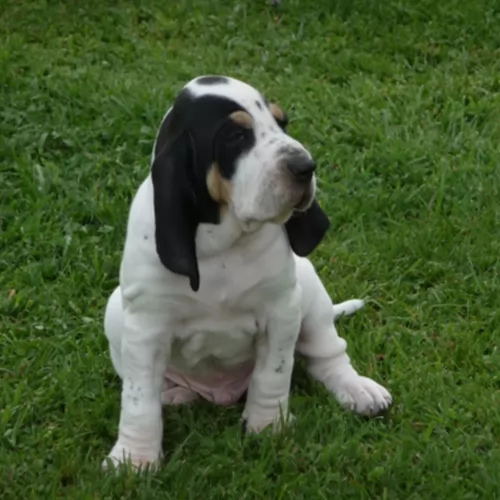 The Grand Anglo – Francais Blanc et Noir is a big, powerful dog standing at 62 – 72cm and weighing 27 - 32kg. His chest is broad and deep.
The Grand Anglo – Francais Blanc et Noir is a big, powerful dog standing at 62 – 72cm and weighing 27 - 32kg. His chest is broad and deep.
The head is flat and broad, the nose black with gentle looking brown eyes. The coat is short and dense for protection and the coloring is black and white. There is a tan dot above each eye. The ears are floppy. The tail is long and tapers down to a slender point.
As a superb hunting dog, this breed lives for the hunt and loves nothing more than to be chasing its prey. The dog has an excellent sense of smell and can track prey in all kinds of terrain.
Although the dog has a stable temperament, he isn’t recommended as being kept solely as a pet, even though he is gentle with children. Maybe its because he has a more serious personality and would prefer to live with active, sport-loving adults than having to contend with the antics of children.
He also isn’t the best dog to have around other small pets as he is so prey-driven he may well be aggressive towards them.
He isn’t a city-loving dog and with his high energy levels he is best suited to properties with large gardens or to farm life. While he will bark and alert you to strangers, he won’t make a particularly good watchdog as he isn’t aggressive.
 Swissies, as they are often referred to as, are large, robust dogs, standing at 65–72cm and weighing anything between 50 – 70kg, with the females being slightly smaller and weighing a little less.
Swissies, as they are often referred to as, are large, robust dogs, standing at 65–72cm and weighing anything between 50 – 70kg, with the females being slightly smaller and weighing a little less.
He has big, rounded paws, medium length floppy ears, a broad chest and a long tail. This is a heavy-boned dog, strong while still being agile.
His dense, double coat is black, white and tan or rust, with black on top of the dog's back, ears, tail and legs. There are two rust dots above each eye. The coat can be short and straight to medium length, coarse and wavy. The dog sheds throughout the year with a major shedding a couple of times a year.
The Greater Swiss Mountain Dog is a sociable canine, thriving on being part of a loving human family. While he used to be a working farm dog, today he is essentially a family pet, though he loves to still be busy.
He is generally friendly with strangers, but just like with all other dog breeds, he will need to be trained and socialized to turn him into an even-tempered, obedient dog, capable of getting on well with children and pets in the the home.
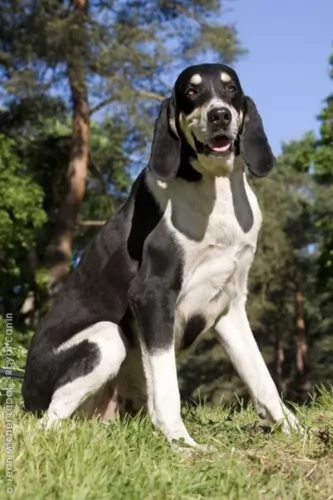 Essentially known as a pack dog, the Grand Anglo-Français Blanc et Noir isn’t going to do well with anyone who lazes on the couch all day.
Essentially known as a pack dog, the Grand Anglo-Français Blanc et Noir isn’t going to do well with anyone who lazes on the couch all day.
He is energetic and driven, and will develop all kinds of behavioral issues if not properly and adequately exercised.
Fitting into a household where hunting is part of the lifestyle will be ideal for him, loving the outdoors and the stimulation that comes from hunting with other dogs.
Provide him with an outdoorsy, active owner and this hunting dog will ensure that he is your loyal and loving companion.
 The Swissy is an easy going dog and adapts easily into his human family’s lifestyle. He is big, but agile dog known for his gentle temperament.
The Swissy is an easy going dog and adapts easily into his human family’s lifestyle. He is big, but agile dog known for his gentle temperament.
While he loves the outdoors, he is a social dog and loves nothing more than coming indoors and being close to his human family.
He loves his family and won’t do well if left outside for days without human companionship. Treat him well and you’ll be rewarded with a loyal, loving 4-legged family member.
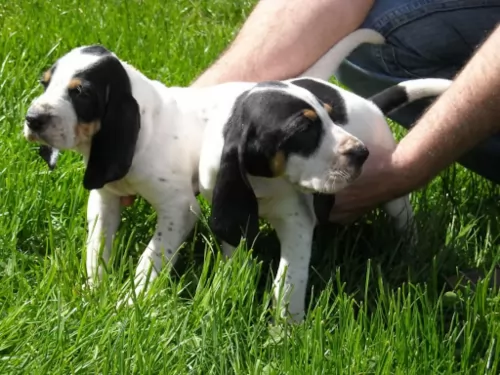 Capable of reaching 10 to 12 years of age when looked after well, there aren’t any specific health issues with this dog. He is likely to experience one or two issues that other dogs have to contend with as well.
Capable of reaching 10 to 12 years of age when looked after well, there aren’t any specific health issues with this dog. He is likely to experience one or two issues that other dogs have to contend with as well.
There are one or two diseases that you want to be aware of -
This dog has long, floppy ears and this means that air doesn’t reach inside the ears properly. He is therefore prone to ear infections. After he has been swimming, dry his ears gently inside.
Unfortunately this is a disease that can strike even when your Grand Anglo-Francais Blanc et Noir is a puppy. Hips which aren’t formed properly can cause stiffness, pain and lameness in your pet.
 The GSMD or Sennenhund, as his name is shortened to, is a fairly healthy dog breed, with very few health issues.
The GSMD or Sennenhund, as his name is shortened to, is a fairly healthy dog breed, with very few health issues.
He has an average lifespan of 10 to 12 years, and although not likely, he can suffer from minor problems such as gastric torsion as well as female urinary incontinence. If your female dog is dribbling urine in her sleep, there are a number of reasons that can be causing it - bladder infections, a medical condition or a weakened bladder with spayed female dogs.
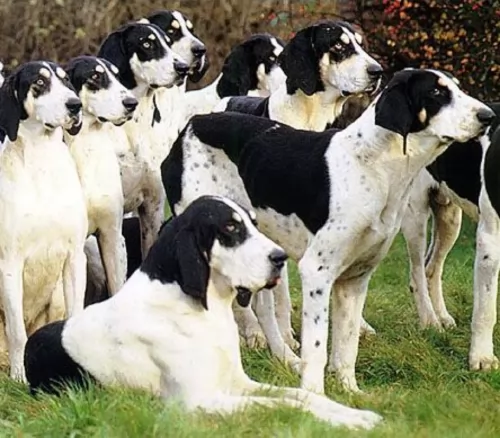 With his short coat and being an average shedder, the Grand Anglo-Francais Blanc et Noir is an easy dog to groom, requiring a brush twice a week.
With his short coat and being an average shedder, the Grand Anglo-Francais Blanc et Noir is an easy dog to groom, requiring a brush twice a week.
Check his ears inside and out, particularly if he goes swimming. Excess moisture in the ear can encourage bacteria and ear infections. See that his nails are trimmed and remember to check his teeth for dental disease which can cause ill health generally.
As a hunting dog, he will need a good deal of exercise. He won’t be content to just go for a walk once a day, but will want something more hectic such as joining you as you go hiking, cycling, swimming or jogging.
As a scenthound, your Grand Anglo – Francais Blanc et Noir is always out and about sniffing around looking for a tasty treat, but with these active dogs, the secret is to small, frequent meals as apposed to 1 or 2 large meals.
It is important to see he gets a nutritionally complete balanced diet that gives him slow release energy. Check with your vet if you’re unsure what to feed him. You want to avoid foods high in fillers, colorants and preservatives.
There are some excellent commercially manufactured dog foods for high energy dog,s but make sure to go for the best brands. You can mix his kibble with some raw meat occasionally and also give him cooked brown rice, chicken and vegetables. He’ll need a constant supply of fresh, cool water.
 The Greater Swiss Mountain Dog is a robust dog and thrives on a diet of kibble to raw meat to some cooked home-made food such as chicken, brown rice and vegetables.
The Greater Swiss Mountain Dog is a robust dog and thrives on a diet of kibble to raw meat to some cooked home-made food such as chicken, brown rice and vegetables.
A serious issue with the GSMD is overfeeding, resulting in uncomfortable digestive problems and of course, obesity.
Your GSMD isn’t a dog that is going to require a lot of exercise like some of the other dog breeds there are, but still his working career of the past requires that he still be taken on daily walks, enjoys ball- and rope games and to go swimming.
Brush your dogs coat at least twice a week to remove loose hears. Other grooming aspects include cleaning the ears to avoid infection, clipping his nails and brushing his teeth at least twice a week.
If you’re not sure how to do all these things, there are useful accessories for dogs that allow you to do all this grooming on your own. Your vet can also show you how as these are all things that will require ongoing attention.